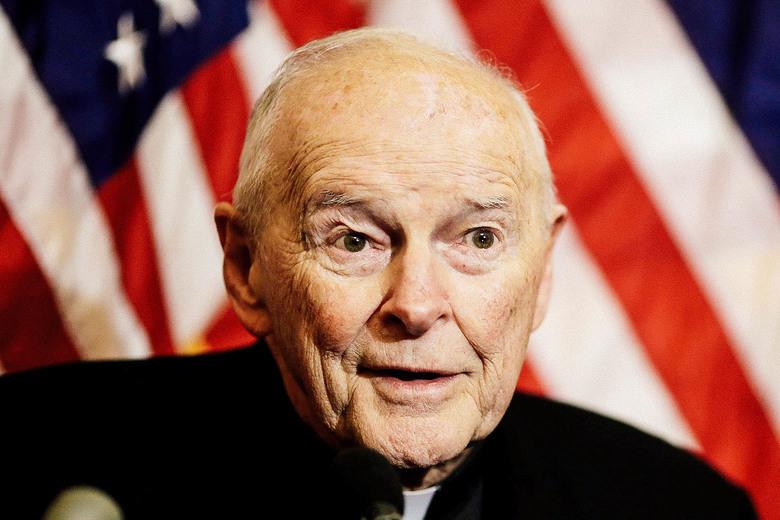|
Theodore McCarrick Is the Top American Catholic Leader to Be Ousted for Child Sexual Abuse Allegations
By Ruth Graham
And here’s why the scandal isn’t going away. The former archbishop of Washington was abruptly removed from public ministry last month after an investigation by the Archdiocese of New York found credible an accusation that Theodore McCarrick had sexually assaulted a 16-year-old altar boy in the early 1970s. McCarrick, who retired more than a decade ago, released a statement saying, “I have absolutely no recollection of this reported abuse, and believe in my innocence.” But, he wrote, he accepted the decision that he no longer practice public ministry. McCarrick is the highest-ranking American Catholic leader to be removed from office due to an accusation of child sexual abuse. Since the announcement last month, more accusations against McCarrick have continued to emerge, thanks to reporting from the New York Times and the Washington Post. In a recent piece, one man said that McCarrick abused him for almost two decades, starting when the boy was just 11 and McCarrick was a 39-year-old family friend the children called “Uncle Teddy.” When the boy was 15, the priest took him to a restaurant in San Francisco and poured vodka in the teenager’s drink, then brought him back to his hotel room and masturbated the boy and himself. Last week, the accuser filed a police report, hoping to, as the Times wrote, “give courage to others who might have been abused, and to find some justice for himself.” Several men who were studying to be priests in McCarrick’s diocese have also accused him of various degrees of sexual misconduct. These abuses of power were not public, but neither were they secret. Two dioceses in New Jersey paid settlements to McCarrick accusers, in 2005 and 2007. A New York priest sent letters to the Vatican and two American authorities about McCarrick’s actions; another priest wrote to a New Jersey bishop about his alleged experiences of abuse. None of this stopped McCarrick from a steady series of promotions and honors within the church. He retired in 2006 and was reportedly allowed to live on a seminary property in his retirement. (In 2016, the Vatican found that the founder of the religious order that staffs the parish engaged in inappropriate sexual relationships with seminarians.) In 2001, just months before the Boston Globe’s Spotlight team would break the story of the last major abuse scandal to rock the American church, McCarrick was made archbishop of Washington. In that role, he helped design and promote new policies on protecting young people in the church and dealing with the sexual abuse of minors, which were announced with great fanfare at a bishops’ conference in Dallas in 2002. “We must put an end to this,” McCarrick said at the time, sitting on a public panel announcing the new documents. “We cannot have Dallas two and Dallas three and Dallas four.” But as many critics have pointed out over the past few weeks, there was an important moment at that meeting of bishops that went largely ignored at the time. The committee replaced the term clerics with the phrase priests and deacons in a document on how the American church should respond to abuse allegations. Clerics would have included bishops in the disciplinary policy, while priests and deacons omitted them. That decision meant that since 2002, priests and deacons accused of sexual misconduct with seminarians have generally been prohibited from serving as pastors and church leaders. But that level of accountability has not—it now seems—applied to the higher ranks of bishops. As accounts of McCarrick’s alleged abuses now emerge, Catholic columnists and media outlets are enraged by the code of silence that protected him for so many years. On Wednesday, Ross Douthat called for “an inquest, a special prosecutor—you can even call it an inquisition if you want” to find out who knew what and when about McCarrick’s violations, and why they remained silent. The National Catholic Reporter proposed a Vatican investigation of the American church. McCarrick’s fate within the church now rests with Pope Francis, who is also facing clerical abuse scandals in Honduras and Chile. Boston Cardinal Sean O’Malley, the pope’s main adviser on sex abuse reform, issued a statement on Tuesday highlighting the “major gap” between the church’s policies toward abusive priests and abusive bishops. But O’Malley himself has been accused of ignoring McCarrick’s sins: In 2015, according to the Washington Post, a New York priest wrote O’Malley’s office a letter about the reports he had heard from seminarians about McCarrick’s behavior. O’Malley’s office wrote him back, saying it wasn’t his job to review individual accusations of abuse.
|
.
Any original material on these pages is copyright © BishopAccountability.org 2004. Reproduce freely with attribution.
